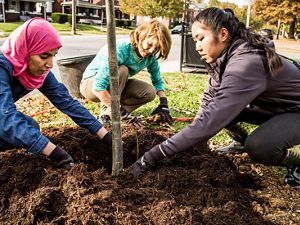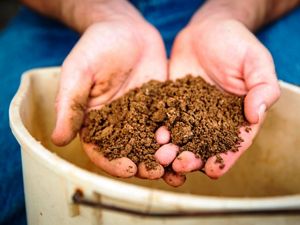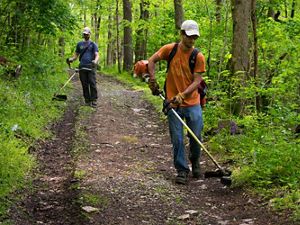Our commonwealth benefits from many Kentuckians who focus on conservation in their daily lives. From farmers who practice conservation agriculture to wildlife biologists who practice science-based management, inspiring stories abound from Kentuckians who put nature first. This series introduces you to these individuals in a Q&A format to amplify Kentucky voices through unfiltered conversations that bring them to life.
If you are a conservationist and have a great story to tell, get in touch with us! Email kentucky@tnc.org and reference Kentucky Stories.
Derrick Mason
Derrick Mason is a wildlife biologist in Louisville, Kentucky. He earned a bachelor's degree in wildlife management from Eastern Kentucky University and has worked for the Kentucky Department of Fish and Wildlife Resources and Resource Designs, Inc. Derrick wants to see more urban African-American kids get outside and enjoy nature, and considers climate change to be our most pressing conservation issue.
How did you learn about The Nature Conservancy?
During my junior year of high school, Chris Chandler came in to talk about TNC’s internship program during class. It was the first time I’d ever heard about TNC. I applied for the internship. They asked me questions about how I worked in a team, our general values and specific situations. I think one of the reasons I got the internship was because of my participation in our school’s environmental club. The summer internship was June through July.
What was your internship like? What did you learn?
We stayed in Steamboat Springs, Colorado at the Carpenter Ranch. I’d never seen snow on a mountaintop before; that was pretty neat. My crew did a lot of trail maintenance on the ranch. It was a very popular birding spot. Throughout the week we would have different projects. We had a schedule for each week: We would go somewhere, collaborate, and work with either local or state agencies. For instance, we got to create a Hügelkultur at a botanical garden. You dig out a giant portion of land, throw in dead logs and wood and cover that up.
Near southeastern Wyoming, we worked with Colorado’s Parks and Wildlife agency to survey toads for chytrid fungus. The fungus has been killing toads and other amphibians at alarming rates.
We did a lot of sightseeing. We went to the state college of Wyoming and to Boulder, Colorado to look at a couple of their colleges. We hiked up more than 12,000 feet to reach the peak of Medicine Bow at the Medicine Bow National Forest. I was determined to get to the top, but some of my friends got altitude sickness. Only a couple of us eventually made it.
Quote: Derrick Mason
I went to Eastern Kentucky University. I definitely felt like a fish out of water coming from an urban area.

How did you know you wanted a career in conservation?
It was definitely during my TNC internship that I knew I wanted a career in conservation. We did a couple of interviews about how the internship went and what we wanted to possibly do. Throughout my time working, I was just thinking, "this is enjoyable." I’d rather spend my days doing this for the rest of my life.
That set me on a track to go to school for wildlife in general. During the internship, the best things were the toads and hearing the coyotes in Wyoming. Not being able to see two feet in front of me was pretty crazy—we camped out there—worked, camped and worked again. That was insane—I’d never seen that many stars. It was like being in a dark room, but I was outside.
Can you talk about your education? What led you to wildlife biology?
I went to Eastern Kentucky University. I definitely felt like a fish out of water coming from an urban area. I guess it got easier as time went on. I wasn’t the best student, but I was learning which study methods worked for me. There were things that just stuck when it came to learning, especially what I was learning in my biology courses compared to my gen-ed courses.
I did a lot of field work outside of class such as wetland delineation, identifying species and statistics. It was required to succeed in senior courses. River cane surveys were part of my last project. My partner, Morgan, and I gathered our data within the Taylor Fork ecological area at Eastern.
All of the connections that I made, all the people I met, were great and the best part about Eastern. I thought I was going to go in and come back out and run back to my mom, but they were very supportive.
What were your first couple of years of work like?
I was a summer camp counselor at Camp Curry for the Kentucky Department of Fish and Wildlife Resources. After that, they hired me for a temporary position as a conservation educator for about three months. And right after that, I got to work extra by collecting lymph nodes from deer to test for chronic wasting disease. Now, I work for a private contractor as a wildlife biologist.
What are some of the biggest issues in conservation and wildlife biology that you’re tackling in your work?
The politics are the hardest thing. Getting the correct information about climate change and making it digestible for the general population is a struggle. You can state facts and have statistics and things like that, but people aren’t going to read it. You have to reduce it down to something that’s easy. We just don’t like to talk about it. Most of my classes had sections of “doom and gloom.” You get used to it. I’d like to spread good news in the future.
I try to keep up with all that goes into global warming. The thing that scares me the most is our lack of freshwater, and the rise in temperatures when it comes to our oceans because they literally affect everything. The urbanization of unprotected wildlife areas hits very close to home for me. I worked at a Kroger when I was in high school. There was a coworker who used to turkey hunt where I lived at the time. I’ll remember that story until the day I die. I can’t believe that all of that land turned into suburbs that fast.
What would you tell someone who was thinking about a career in conservation?
I would say that your motivation has to be about how passionate you are about the work rather than the money you make. You have to be willing to move to work. Money’s going to be tertiary. I was lucky to find a job in Louisville.
What gets you up in the morning to do this work?
The number one thing I think about is, as a student, how I would feel if I saw an African American in the wildlife field. What gets me going is being a role model and an inspiration for younger people that look like me and grew up in the same areas that I did. Just trying keeping people interested in going outside.
I was the only person of color in my class to graduate with the major that I had. I often felt disconnected because I wasn’t raised in a rural background. You gain knowledge by living in areas like Somerset, Prestonsburg or northern Kentucky when it comes to wildlife. Coming from Louisville, the things I learned in school prepared me for what to expect in Louisville, not in nature. I do wish I knew about the parks throughout Louisville growing up. Now, I to go to Jefferson Memorial Park or to Turkey Run to hike with either my girlfriend, Allie, or my buddy, Peter.
Robbie Williams
Robbie Williams manages a multi-generational farm in Henderson, Kentucky. Robbie Williams Farms is partially powered by solar and geothermal energies, and Robbie has helped dozens of friends and neighbors make the switch to solar energy. He believes we must all be part of the solution to climate change.
What was it like, growing up on a farm?
I was blessed to be in a very nurturing environment. My mother had a business in town and my dad farmed. My two grandparents’ farms adjoin—all four grandparents on two farms. I came from a very nurturing, stable, loving family and a very educational, nurturing environment.
What do you love about farming?
There are always opportunities to do things for others; There are always opportunities for problem solving. There’s always a higher purpose: for example, feeding people or environmental concerns. I always say that a good farmer and a good environmentalist are the same thing.
How do farming and caring for the environment relate to each other?
Farming is very energy-intensive. Farming impacts the soil and water. Everything a farmer does is on a big scale and has a lot of impact. Farmers use a lot of energy and farmers have a long-term perspective, especially if you’re farming land that has been in your family and your landlord’s family for generations. There’s a continuity that you want to enable the dreams of others, much in the same way you were brought up yourself and you were enabled.
I have worked on 24 solar arrays locally; I’m building three right now. Energy is just something that you’re keenly aware of. Frankly, I think that the more clean energy we can switch to, the more it protects fossil fuel resources. You take things like a combine harvesting grain that probably has a 500-horsepower engine running at 10 hours a day. We don’t have technology anywhere where batteries can handle those loads, like a tillage tractor or a combine. That’s not to say we shouldn’t aspire to get there someday. That’s not to say we shouldn’t use clean energy on a scale that’s possible. There’s no reason my car can’t be electric. We consume a lot of fossil energy but there’s no reason we can’t conserve energy with geothermal. It’s important that we should develop an energy mix and figure out how we can make everything work together.
What else can farmers do to address environmental issues like climate change?
No-till and minimum-till farming returns carbon to the soil, and there are other soil conservation measures like reforestation and cover crops. All of those things protect the air and water. For example, when the rainforest in south America is degraded, there’s tremendous carbon released into the atmosphere. We can always do a better job here with minimum till and no till. We should avoid aggressive tillage as much as possible.
What are you doing to ensure your farming operations are more compatible with nature?
Solar is kind of my thing lately. I would say that we do as much minimum or no-till as possible, and we’re keenly interested in energy. We produce far more electricity than we consume. I’m proud that we provide clean energy to our neighbors through our local cooperative, Kenergy. We have a very positive relationship with them. My energy provides a percentage of clean energy for our neighbors, and that would not be possible without our local electric cooperative.
How much solar energy do you produce on your farm?
Altogether on the home farm, we have about 270 solar panels. That powers our whole farm—that and then some. It keeps the lights on, and powers grain bin fans, geothermal heat pumps, and multiple shops. We produce about 100,000 watts of electricity at peak output.
Keep in mind, this still requires an energy mix. Right now, energy storage technology is in its infancy. At night when the sun’s not shining, we’re running on fossil energy. We’re producing more energy during the day, but we still rely on fossil fuels at night. I think it’s positive to reduce fossil energy. But we have to make this all work together.
I think the political environment is such that everything is all or nothing, red or blue, renewable or not. We should not think of everything like that. Science in general should never be politicized. When something is politicized, it develops shallow, incorrect conclusions. We need to move forward with scientific facts. We can promote renewables all the while knowing we have to have fossil energy for some things. We need to be thinking, how do we make different forms of energy work together?
What about solar siting?
This is something very, very important. There are utilities that are buying up prime cropland and putting up utility-scale solar arrays. And there are people becoming very negative toward solar because they may be losing a farm.
I make the argument that if more individuals took a steep hillside out behind the barn or an unused lot not suitable for crops, and installed solar, that would mitigate the need for turning these huge farms into solar farms. Furthermore, that energy would be distributed and reliable. It would be more resistant to storms if it’s not all in the same place. I think every farmer would have a suitable place to install a solar array on the farm.
We as a society should not be consuming premium cropland for utility-scale solar farms when we could be doing it on a more distributed basis. We could be using reclaimed strip mine land, closed landfills, and things like that. You don’t see that happening. It’s a little bit more of an engineering challenge, but right here in Henderson County, Kentucky, we have reclaimed strip mines with power lines going straight through them. There’s talk about putting solar arrays on them, and I hope that happens. There are more appropriate places to build solar than on premium cropland.








